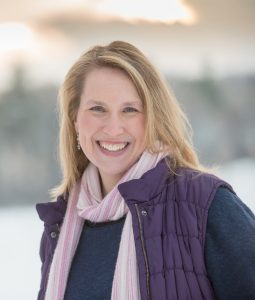If at first you don’t succeed, try, try again.

Success in losing weight, however, is often achieved during the first try, but not as readily during second and third tries, after pounds lost have been regained.
Getting and staying fit involves resilience extraordinaire when, as former Food and Drug Administration commissioner David Kessler said, “Our brains are getting constantly hijacked.”
American Hiking Society Ambassador Kara Richardson Whitely has her own story of resilience, and at 3 p.m. Saturday in the Hall of Philosophy in the Chautauqua Women’s Club Contemporary Issues Forum, Whitely will unpack some of her personal struggles with eating and exercise in her talk titled, “Moving Mountains: Three Climbs on Mt. Kilimanjaro.”
To her surprise, on her second trek up the 19,341 foot mountain in Tanzania, Africa — one of the world’s Seven Summits — Whitely didn’t make it all the way to the top, as she had the first time. Hence her third try and second summit.
Whitely has written two memoirs, Gorge: My Journey Up Kilimanjaro at 300 Pounds and Fat Woman on the Mountain: How I Lost Half Myself and Gained Happiness. Currently, she is completing a third, The Weight of Being.
Two summers ago, Whitely finished Gorge while hiking and writing in the French Alps with Cheryl Strayed, author of Wild: From Lost to Found on the Pacific Coast Trail, who had pushed her to write. Whitely said this was one of the best experiences of her life.
Strayed wrote the front-cover blurb for Gorge, saying that Whitely takes readers “where few have dared to go before: thrillingly up to the top of Mt. Kilimanjaro and profoundly down to the darkest depths of food addiction. Fearlessly honest and powerfully intelligent, this beautiful book is moving and inspiring on every page.”
As hard as it is to avoid overeating in general, and over-consuming intentionally addictive food-like products in particular, overcoming childhood adversity may be even more difficult.
Introduce into this mix favorite “comfort foods” such as Coca-Cola and M&M’s, including on strenuous hikes, and those two challenges can readily conjoin and fuel others.
In writing Gorge, Whitely said, “the challenge was to truly convey how much I struggled. My biggest challenge wasn’t the mountain, but issues of food.”
She said that for her agent, it didn’t matter so much what she put on the page. No matter what she wrote, someone would identify with it because two-thirds of Americans struggle with food.
“For so many years, my eating issues had been secret,” Whitely said. “Even though I wore the pounds on my body, my binges weren’t public. Now a milkshake is a bad choice. Before, it had power over me.”
It takes an exceptional individual to confront and come to terms with traumatic childhood experiences and the repercussions of having coped with them by overeating and under-exercising.
Whitely’s story has appeared in The New York Times, Huffington Post, People, American Hiker and many other media outlets.
“I had a fear that I’d be a victim on the internet,” she said. “There’s a lot of hate-shaming. Every time an article came out, there was nothing directed to me. My biggest fear was that people would act like idiots. But they didn’t.”
By turning her personal dreams of adventure into breathtaking treks — literally and figuratively — and by closely examining her lifestyle and sharing it publicly, Whitely has moved on.
“I still struggle with food everyday,” she said. “But the deep-seated stuff has subsided.”
Formerly a journalist, she is now a motivational speaker whom Google, Oprah’s Lifeclass, “Good Morning America,” CNN and many other organizations and colleges around the U.S. have featured.
“I love to speak and travel around the country,” Whitely said. “My message is about achieving what you don’t think is possible in your life. That all happens when you live your life for yourself.”
What she means by this, she said, is that it’s important to love yourself where and as you are, and go from there.
“Often for me I hated my body. I would wait to go to the doctor or buy clothing until I dropped pounds,” she said.
Now she hikes and doesn’t wait to do things until she’s lost weight.
Whitely’s next book is due next spring.
“The Weight of Being is about the human experience of being overweight,” she said. “Especially being a parent and creating a healthy life for my family, even when I don’t get it right.”
Originally, the name of the book was Family Plot.
“You may plant the seeds, but still, people tend to grow in their own ways,” she said. “It comes back to my family garden plot.”
Whitely and her husband live in New Jersey with their three children, ranging in age from seven months to 8 years old.
“Sometimes it’s a little like being an air traffic controller,” she said. Then, as when hiking mountains, “I put one foot in front of the other.”




